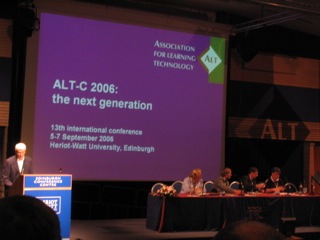ALT-C 2006 Edinburgh
I have just returned from the 13th International Conference of the Association for Learning Technology (ALT) in Edinburgh.
I find Marc Prensky's 'digital immigrants' versus 'digital natives' analysis hard to take - in my view, another case of focussing on the wrong issue (brain science) - when the more useful analysis would look at patterns of social and cultural development. I think that that the 'net generation' may have a greater familiarity and confidence with technology simply because they have more time on their hands and worry less about risk, thus creating opportunity and courage to engage in informal learning with devices that offer the best feedback loops of any domain.
Phil usefully spotted some studies which feed my doubts, stating in his summary that -
-
"Generational differences are relatively unimportant in explaining comfort with technologies and, in any case, are commonly 'washed out' within 6 months to a year".
I think this came from Ann Wilkinson's presentation: 'The evidence for the next generation learner'. In referring to the health professionals in her study, Ann writes -
-
"over the critical first six month period they make significant adjustments and adapt to the expectations of their programme".
I think this matches our experiences with student researchers in our online degree, who on average are aged 40 and 80% are women.
In his summary, Phil also noted -
-
"Game-playing in early life does not seem to be particularly influential in the use of ICT for learning purposes"
Again, I think this came from Fiona Littleton's report: 'Next Generation Learners: The impact of videogame play on a student's approach to learning?'. I went to this session, which contrasted some student teachers who had extensive video-game-playing pasts with others who had not. Fiona reported little difference in learning styles and strategies between these two groups.
The danger of the immigrant/native argument (apart from the tainted language) is the way it suggests that older folk have no hope of making sense of the younger from within their experience - I suggest it's quite possible to become native, if only one can set aside time from the day-job, family care and leisure to play with the creative and fulfilling tools that are now available.
Ricardo’s Blagado
Saturday, 9 September 2006
